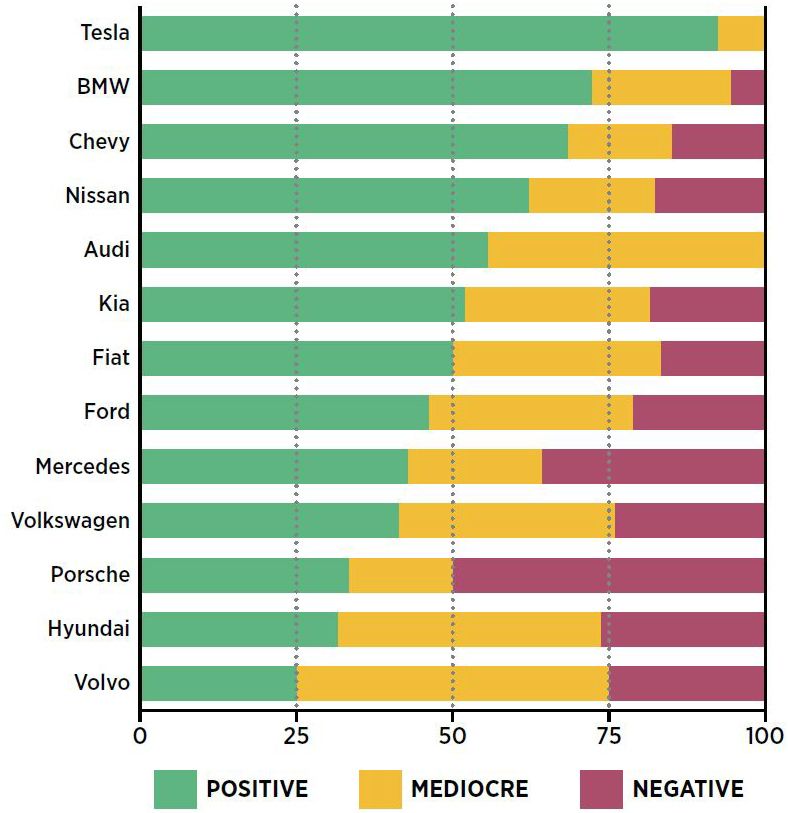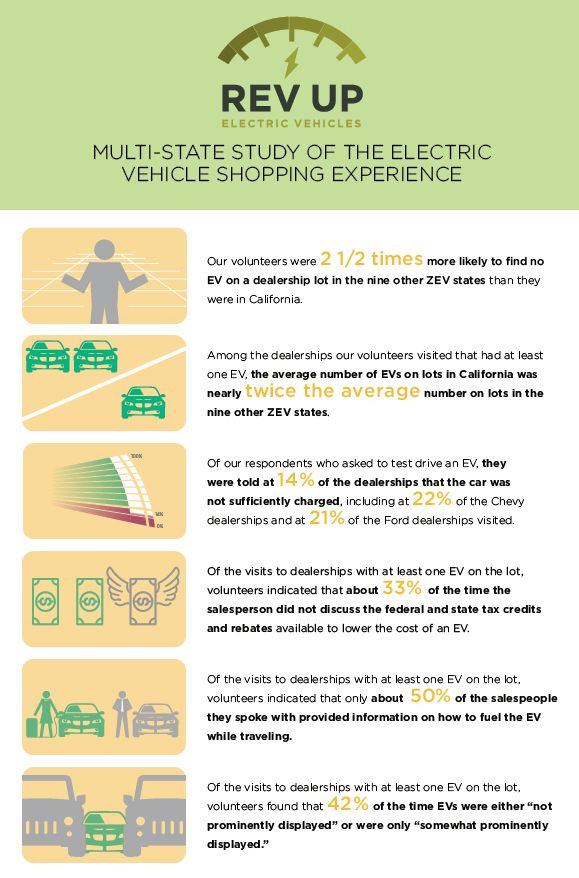

By Gina Coplon-Newfield and Mary Lunetta
Electric vehicles (EVs) are cleaner, greener and more fun to drive. Different mileage ranges, prices and car types abound with about 30 plug-in electric sports cars, SUVs and sedans now available from Chevrolet, Nissan, BMW, Ford, Tesla and many other automakers. Shopping for an EV should be fun and easy. So, with so many terrific options available, why are EV sales still at only one percent of total monthly U.S. auto sales?
We launched Rev Up EVs, the first-ever multi-state study of the EV shopping experience, to find out. Based on surveys from Sierra Club volunteers who called or visited 308 different auto dealerships and stores across ten states to check out and test drive EVs, the study finds that there is tremendous room for improvement among both the dealerships and the automakers to provide customers with a better EV shopping experience.
The California Air Resources Board’s Zero Emission Vehicle (ZEV) program requires automakers to sell increasing numbers of EVs between now and 2025. Because of the many environmental and economic benefits of electric vehicles, the ZEV standard is now followed by nine other states as well. With the standards currently up for review, many automakers are lobbying regulators to weaken zero emission vehicle regulations, saying they are doing everything they can to sell EVs.
But the numbers don’t add up. A recent Union of Concerned Scientists and Consumers Union survey of randomly selected drivers found that 55 percent of survey respondents in Northeastern states and 65 percent in California are interested in EVs, and that 65 percent of surveyed California drivers wish there were more EV options. An earlier survey of driving habits showed that for more than 40 percent of Americans, switching to an electric vehicle would be practical right now. With such high interest, EV sales should be accelerating at a much faster pace.

By studying the EV shopping experience in each of the ZEV states, the Rev Up EVs study found that some automakers and auto dealers are doing a great job developing, marketing, and selling EVs to consumers by having several EVs on their lots, informed salespeople, and strong EV advertising. These best practices are not rocket science. But many other dealers and automakers are falling short.
The first step to selling any car is to actually have it available for purchase — you can’t sell a car that isn’t there. But the Rev Up EVs project found that it’s often difficult to find an auto dealership with even one electric vehicle on its lot. Auto dealerships in the nine other ZEV states were 2 ½ times more likely than those in California to find no EV on the dealership lot for customers to see, test-drive, and lease or buy.
Availability may be the first step to selling a car, but it’s not the only area with room for improvement. Even at dealerships with at least one EV on the lot, about one third of the salespeople at surveyed dealerships failed to provide their customers with information on the tax credits and rebates that make EVs significantly more affordable and that are proven to increase electric vehicle sales.

To increase EV sales, we can’t lower the bar for the auto industry. We need the industry to step up and put best practices to work to sell EVs and comply with the ZEV regulations. In fact, to achieve our climate, air quality, and EV sales goals, we need even stronger ZEV regulations. And it’s possible. Automakers can increase inventory and multi-state distribution of EVs, as well as offer attractive deals to dealerships. Once they’re on dealers’ lots, EVs need to be charged, ready for test drives, and prominently displayed. Auto dealers and makers need to train their salespeople on the ins and outs of EVs so that salespeople can answer customer questions. Finally, automakers need to increase advertising of their EVs which, in turn, will encourage dealers to advertise more at the local level.
In less than a month, drivers across the country will take part in the largest celebration of electric vehicles, National Drive Electric Week, now in its sixth year. At upwards of 200 parades, ride and drives, charging station ribbon cuttings, city fleet displays and other community events, people across the country will showcase the many benefits of driving electric. In previous years, we’ve found these events to lead to more people heading to dealerships to buy or lease EVs. Will the industry be ready to welcome these customers?
Gina Coplon-Newfield is the director of the Sierra Club’s Electric Vehicles Initiative. Mary Lunetta is the campaign representative for the Sierra Club’s Electric Vehicles Initiative.

 233k
233k  41k
41k  Subscribe
Subscribe 
